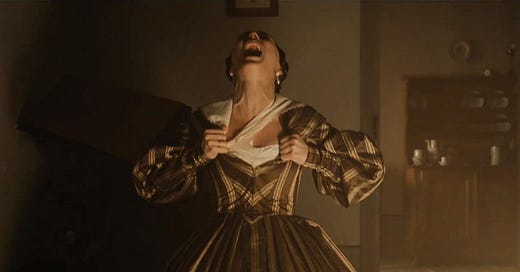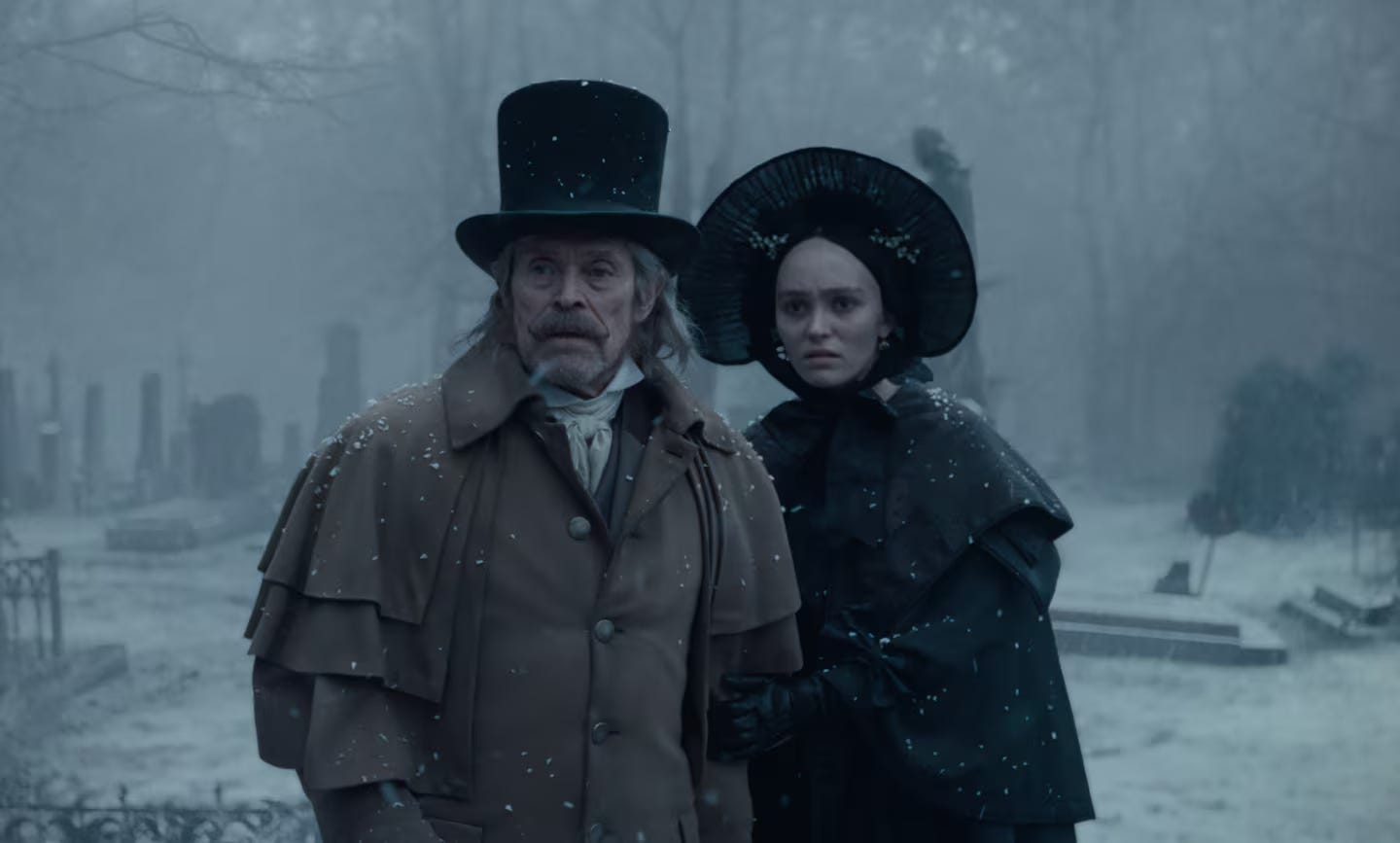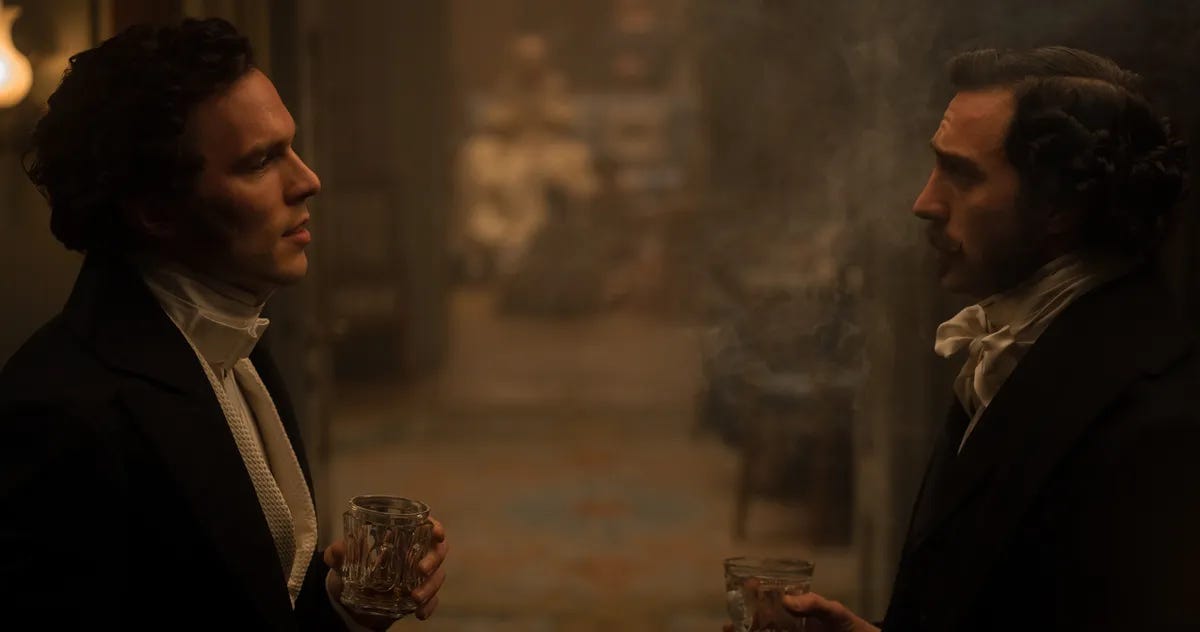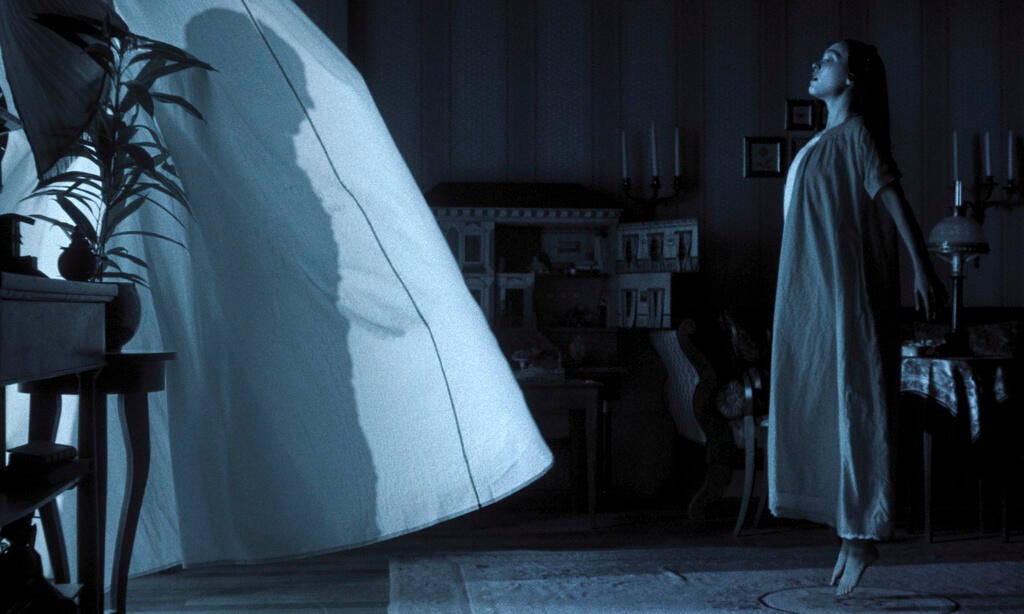Per liberarsi dal corsetto: Nosferatu e la libertà delle donne
La recensione (breve ma intensa) del film diretto da Robert Eggers e interpretato da Lily-Rose Depp
Benvenut* alla puntata numero 38 di Pinguleaks, la newsletter di cui non saprai mai in anticipo l’argomento o il giorno in cui arriverà. Questa recensione è scritta da Cla Calabresi.
Pinguleaks è una newsletter gratuita, ma se vuoi supportare il nostro lavoro, puoi donare cliccando qui sotto:
La moglie di Thomas Hutter ha la melancolia: bisogna stringerle il corsetto, somministrarle sedativi intossicanti, legarla al letto e reprimerla in ogni modo per tentare di guarirla. Le sue convulsioni potrebbero essere contagiose, la sua bellezza diafana, da “silfide”, troppo intensa per non portare al disastro. Come per Elena di Troia, un’intera città viene assediata per lei, e infatti porta lo stesso nome, Ellen.
Nel Nosferatu di Robert Eggers la fascinazione per il male, fenomeno ormai ampiamente sdoganato nell’era dei neofascismi, si accompagna a una confessione: quel male che ipnotizza potrebbe partire da noi stessi, non dagli altri, come Ellen confessa alla sua unica guida sincera, il dottor Von Franz. “In tempi pagani saresti stata una meravigliosa sacerdotessa di Iside” risponderà lui molto più tardi; proprio il dottor Von Franz è l’unico a immaginare per Ellen uno scenario diverso da quello che la delega al ruolo di vittima sacrificale di una società al collasso.
C’è un desiderio composito, in Nosferatu, di dare nuovi nomi alle cose, e quindi di cambiare prospettiva sulle cose stesse. La fiducia abbagliante nel secolo dei lumi non ha funzionato, e la sua deriva ultrarazionalista ha portato a ignorare i tormenti delle donne e un dolore crescente dentro di noi che, se non ascoltato, conduce alla follia e alla crudeltà. Ellen, sensibile, ricettiva a ogni cambiamento, veggente dell’imminente tragedia, è il capro espiatorio di mostri ciechi e disorientati una volta chiamati uomini. È chiara infatti la scala che da Friedrich Harding, ossessionato da una scienza primitiva e sessista, porta a Herr Knocks, nel cui grigio ufficio convivono scartoffie e un altare dedicato al diavolo, fino al demone stesso che li tiene in scacco e brama la capacità di amare, il conte Orlok.
Nella mancanza di una fede in qualcosa, una cosa qualsiasi oltre alle bugie che ci si dice per continuare a vivere all’interno del sistema, rimane soltanto l’amore innocente e un po’ infantile della coppia, nucleo minimo di salvezza dal cielo coperto di Wisborg. Ciò che è rifugio per Thomas e per Friedrich diventa tuttavia prigione per Ellen e per Anna, che nella loro affettuosa amicizia condividono l’insofferenza per un mondo che le considera creature deboli e insicure.
A essere davvero soggiogati dalla promessa di Nosferatu sono infatti gli uomini di Wisborg: chi nel denaro, come Thomas, chi nel sollievo di essere soltanto suddito e passivo, come Knocks, chi nella scienza delle navi che partono e ritornano, come Friedrich. Ellen è in realtà la sola ad ammettere la natura effimera della ragione e quindi ad avere speranza di non perderla del tutto: sì, c’è qualcosa che può crescere dentro di noi fino a sciamare senza controllo come i cinquemila topi di cui Willem Defoe parla nelle interviste, ma quel qualcosa che normalmente ci disgusta è la stessa forza propulsiva che può sconfiggere la vanità del maschio illuminista e borghese.
Le convulsioni di Ellen finiscono per liberarla dal corsetto e dalle corde, fino a strappare il vero limite che le porrebbe una vita confinata nella sua prigione domestica. È lei ad avere la forza di ammettere il desiderio per ciò che è insieme ripugnante e irrestibile, e a sconfiggere il conte Orlok offrendo volontariamente il suo corpo e la sua anima a qualcuno che è “peggio del diavolo”. A Wisborg Dio è morto, ucciso dai falsi profeti. Rimane Nosferatu, la cecità del progresso senza limiti etici che si infrange di fronte ai limiti della natura umana e della terra, nel lungo sonno che genera mostri. L’unico modo per non farlo vincere, dice il film di Eggers, e grida la strepitosa interpretazione di Lily-Rose Depp, è riconoscerlo allo specchio.
[ENGLISH VERSION]
Thomas Hutter's wife has melancholia: one must tighten her corset, administer intoxicating sedatives, tie her to the bed, and repress her in every way to try to cure her. Her convulsions could be contagious, her diaphanous, “sylph-like” beauty too intense not to lead to disaster. As with Helen of Troy, an entire city is besieged for her, and in fact bears the same name, Ellen.
In Robert Eggers' Nosferatu, the fascination with evil, a phenomenon now widely cleared through customs in the age of neo-fascism, is accompanied by a confession: that hypnotizing evil might start with us, not with others, as Ellen tells her only sincere guide, Dr. Von Franz. "In heathen times, you might have been a Great Priestess of Isis” he will reply later on; doctor Franz is precisely the only one able to imagine for Ellen a different role than the one of sacrificial victim designed by a society on the verge of collapse.
There is a composite desire in Nosferatu to give new names to things, and thus to change perspective on things themselves. Dazzling confidence in the Age of Enlightenment has failed, and its ultrarationalist drift has led to ignoring women's torments and a growing pain within ourselves that, if not heeded, leads to madness and cruelty. Ellen, sensitive, receptive to any change, a seer of impending tragedy, is the scapegoat of blind and bewildered monsters once called men.
Indeed, the scale is clear from Friedrich Harding, obsessed with a primitive and sexist science, to Herr Knocks, in whose gray office coexist paperwork and an altar dedicated to the devil, to the very demon who holds them in check and craves the ability to love, Count Orlok.
In the absence of a belief in anything, anything other than the lies one tells oneself to continue living within the system, only the innocent and somewhat childish love of the couple remains, the minimal nucleus of salvation from Wisborg's overcast sky. What is refuge for Thomas and Friedrich, however, becomes prison for Ellen and Anna, who in their sincere friendship share impatience with a world that considers them weak and insecure creatures.
Indeed, it is Wisborg's men who are subjugated by Nosferatu's promise: some in money, like Thomas, some in the relief of being merely subservient and passive, like Knocks, and some in the science of ships leaving and returning, like Friedrich. Ellen is actually the only one who admits the ephemeral nature of reason and thus has hope of not losing it altogether: yes, there is something that can grow within us until it swarms uncontrollably like the five thousand rats Willem Defoe talks about in interviews, but that something that normally disgusts us is the same driving force that can defeat the vanity of the enlightened, bourgeois male.
Ellen's convulsions end up freeing her from the corset and the ropes, to the point of tearing away the real limitation that a life confined to her domestic prison would place on her. It is she who has the strength to admit the desire for what is both repugnant and irresistible, and to defeat Count Orlock by offering her body and soul to something that is “worse than the devil.” In Wisborg God is dead, killed by the false prophets. That leaves Nosferatu, the blindness of progress without ethical limits that shatters in the face of the limits of human nature and the earth, in the long sleep that breeds monsters. The only way not to let him win, says Eggers' film, and cries out Lily-Rose Depp's resounding performance, is to recognize him in the mirror.









